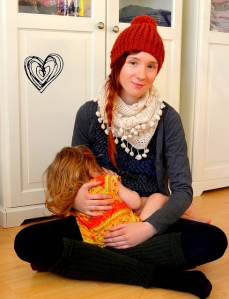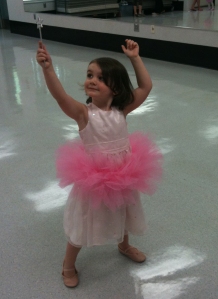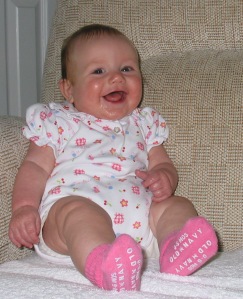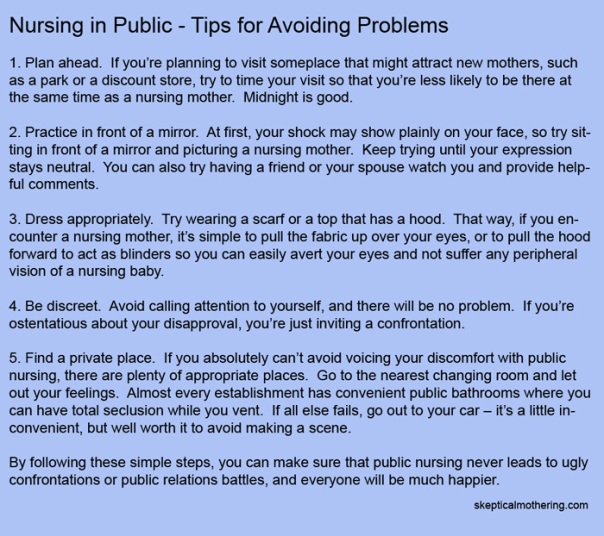Category Archives: Breastfeeding
Breastfeeding harassment, the YMCA, and progress
I was reading Best for Babes’ recent post about moms being hassled or ejected from various venues for breastfeeding. They mention an incident at a Charlotte YMCA, and go on to note that through the years different Ys throughout the country have put the kibosh on nursing in public. It vividly reminded me of my own incident at a Y, which still makes me a little angry after all these years, but which also illustrates how much progress we’ve made.
In 2003, I joined the Y near my house in Durham. My daughter was just shy of four months old, and of course I wound up nursing her when we were there. I described what happened in a letter I wrote to the Executive Director at the time:
As a new member of the Lakewood YMCA and a breastfeeding mother, I would like to know whether your organization has an explicit policy supporting breastfeeding.
I ask this question because of an unfortunate incident during one of my recent visits to the Lakewood facility. I was nursing my daughter in the lobby area when a staff member approached me and asked me to “do that somewhere else.” She expressed particular concern that the high school students would see us, and specifically said it would only be acceptable for me to feed my baby where “no one can see you.” She suggested the locker room. To me, this directive displayed a hostile and fearful attitude toward breastfeeding, treating it as though it were something dirty or perverse, something children shouldn’t be exposed to.
I hope that this is not reflective of the YMCA’s official position on breastfeeding. As you may be aware, the American Academy of Pediatrics recommends that mothers breastfeed their babies during the first year of life, for optimum health and development. As an organization that promotes health and family closeness, I hope that the YMCA would encourage and support breastfeeding to the greatest extent possible.
If no such supportive policy is in place, I urge you to implement one. If, on the other hand, my recent experience is indicative of your current policy, I ask that you reconsider your position. Breastfeeding mothers are doing the best thing for their babies, and they need sympathy and encouragement. Breastfeeding can be a big challenge, and the last thing nursing mothers need is an implicit message that their behavior is somehow deviant and not fit to be seen in public.
Thank you for your attention. I look forward to hearing from you regarding this issue.
Guess what I heard back – bupkis. I never got any kind of response. And in those days, that was it. It never occurred to me to try to stage a nurse-in. That wasn’t even a thing yet, as far as I know! Nor did it come to mind to contact local media. No one cared enough for this to be news. I was just one mom, on my own. Today, as I read about the immediate community response to the Charlotte incident, and how that prompted the Y to listen and change its policies, I actually got a little misty, thinking of how much that would have meant to me at the time.
No matter how confident, sassy, and assertive a person you are, I think when someone criticizes and evicts you over breastfeeding, you tend to feel extremely vulnerable. I’m so immensely proud and gladdened that breastfeeding mothers and their supporters have come together and lent their collective power to every mom who is harassed and shamed by the ignorant. Because of all of us making some noise about these things, it has even become a news event when a business kicks out a nursing mom. Things are getting better. Moms and babies are more protected. All of you out there standing up for mothers and babies, for nursing being normal, are making real progress. I just want to celebrate this, and remind everyone to keep up the good fight.
Mothers breastfeeding “for their own gratification”
 “There’s an admittedly fine line between the beautiful bond between mother and infant and the weird gratification some women get from breast-feeding in inappropriate and exhibitionistic ways.”
“There’s an admittedly fine line between the beautiful bond between mother and infant and the weird gratification some women get from breast-feeding in inappropriate and exhibitionistic ways.”
“A kid who can write her own name shouldn’t be nursing. If you like your nipples sucked, let your husband do it.”
“It’s not being used as a form of birth control; it’s being done for the sole satisfaction of the parent.”
“I think that most of this is for the mother’s benefit. I personally know of one instance of this, and in that case it was the mother who was unable to let it go…”
“She must be nursing for her own gratification.”
Those are all genuine quotes about nursing an older child. And I hear and read all the time about people saying “Oh she’s just doing it for her own gratification,” or “at that age, it’s not for the child – the mother is doing it for her own purposes.” I have two, related, problems with this sentiment.
First, it’s very silly. Imagine if people said stuff like:
“There’s an admittedly fine line between the beautiful bond between mother and infant and the weird gratification some women get from cuddling a baby in inappropriate and exhibitionistic ways.”
“A kid who can write her own name shouldn’t be read to anymore.”
“At that age, lullabies are not needed to put a child to sleep; it’s being done for the sole satisfaction of the parent.”
“I think that kissing a booboo for a preschooler is really for the mother’s benefit – these mothers are just unable to let it go…”
“By now she must be brushing her child’s hair for her own gratification.”
If anyone shared the above opinions publicly, people would think they were nuts. Children have needs and wants. Some continue in one form or another from birth through the school years. No one would seriously argue that parents shouldn’t hug their children once the children can ask for it, or that a parent shouldn’t do anything for a child that she can arguably do for herself, or that a pleasant parenting routine must cease once it is not strictly necessary for the child’s physical health. We all understand that parents frequently do”babyish” things with their older children because it pleases the child, it helps accomplish the parents’ goals, it provides emotional support, or it’s more convenient. Yet somehow when it comes to breastfeeding, this understanding is forgotten. And I think it must be because of my second issue –
So frequently, critics of sustained nursing bring a sexually perverted perspective to the conversation. Mothers and babies do not find anything sexual in nursing. It’s the people loudly complaining who seem to find breastfeeding sexually charged. Look at the way people criticized sustained nursing when that Time issue came out:
“Exhibitionist”
“Inappropriate”
“If you like your nipples sucked, let your husband do it”
“When your kid starts noticeably sporting wood at meals, it might be time to wean.”
“Sorry, this looks like a circus midget having the time of his life.”
“I think the biggest deal is that he’s still walking up to her boobs. If you wanna breastfeed until your kid is a teenager, then fine…do your thing. But pump the damn milk!”
“Borderline child porn.”
“At this age what is the difference in this and a father making his daughter touch his private parts?”
For people who relate to these comments, please try to get some perspective. Breastfeeding is not inherently sexual. Breasts are not inherently sexual. Yes, our current culture in America treats breasts almost exclusively as sex organs. Yes, many people assume that it’s a basic biological fact that breasts are sexual. They forget that people once felt the same way about women’s calves. That many people today feel the same way about a woman’s bare face or exposed hair. Throughout human history, different cultures have “known” that certain female body parts are so sexually stimulating they must be hidden, and that they could never be viewed as just a normal body part.
Families who are used to sustained nursing view a breast just like you view a woman’s leg. Sure, in some situations, to some people, it might be something sexy, but it’s not perverse or abusive to let your preschooler sit on your lap. Try to adjust, and realize your discomfort is a perception, not a fact. It’s OK if you feel uncomfortable. You can’t necessarily control that. But do please engage your rationality and recognize that you feel uncomfortable for the same reason that imams feel uncomfortable with they see Western women wearing pants.
To sum up, it’s silly to think that a benign, useful parenting behavior becomes wrong if it’s no longer strictly necessary, or the child can request it, or do it for herself. Nursing is no different – there’s no time when it magically becomes illicit and sexual. If you see a mother nursing an older child and it seems sexually perverse to you, you are the only one of the three people who is having sexual thoughts.
How I wound up nursing my kids till they were four
 First, you must understand that I never imagined I’d breastfeed an older child. When I was ten or so, our next door neighbor was still nursing her four year old, and let me tell you, we thought she was a freak! I mean, she was a really nice person, and our families had a good relationship, but the nursing thing sure seemed beyond quirky.
First, you must understand that I never imagined I’d breastfeed an older child. When I was ten or so, our next door neighbor was still nursing her four year old, and let me tell you, we thought she was a freak! I mean, she was a really nice person, and our families had a good relationship, but the nursing thing sure seemed beyond quirky.
Years later, when I decided to have a baby, my first thought on nursing was that I would do it, but I would stop once the baby got teeth. Perhaps understandable for someone who didn’t know how young babies are when they get teeth, nor how nursing mechanics really work. When I did some reading and learned that babies should nurse at least one year, I got on board with that.
Then my daughter was born – the day before I was scheduled to take a breastfeeding class at the birthing center. I nursed her in the first hour after she was born and thought I was doing OK. But in the next few months I had about every breastfeeding problem except for mastitis and low supply. It’s funny how I used to be worried about nursing a baby with teeth, because a baby with tongue-tie quite effectively lacerated my nipples in short order, no teeth required. Even after we corrected that, it was so hard to latch her on. I felt like I needed at least four hands. (I would have slapped anyone who suggested I put a blanket over the baby while nursing in public – I needed to use both hands and studiously watch what I was doing to get even a so-so latch – there was no way to drape a blanket over us and actually nurse.) And once I had figured out oversupply and forceful letdown, I developed yeast. Basically my nipples hurt like hell for at least three months straight.
And yet, I hung in there because I had decided breastfeeding was very important to me, and I felt if I could just get through the difficulties it would be worth it. And I did, and it was. Finally nursing became a good part of life. It was a moment to sit down and rest, to love on my baby, and as she grew it became more and more of a parenting tool. In addition to providing the nutrition and hydration she needed, nursing offered soothing, reassurance, and a gateway into sleep.
Before I knew it, my baby was turning one. And she was still a baby. It seemed silly to try to make her stop at that point. How could nursing be recommended one day, but totally useless the next? On her birthday she wasn’t a year older, she was a day older. Besides, the WHO recommends nursing until at least two. Plus I have to say there was a certain determination on my part, like “It took us sooo long to get this working, I’ll be damned if I make her stop now!” So we kept going. And nursing continued to be useful, quelling tantrums and making nap time peaceful, as well as serving as a nutritional safety net.
By the time Chloe turned two, I was a member of La Leche League, and I had a community where nursing until children are ready to stop is perfectly normal. I really couldn’t see a positive reason to make her wean when she showed no inclination to. Nursing was still a useful parenting tool, and something my daughter enjoyed and benefited from. On the other side of the scale, the arguments for weaning were weak to say the least. The predominant argument people have against continued nursing boils down to “It seems weird and makes me uncomfortable.” My husband had the least dumb reservation about my nursing a two-year old – he said, “If it were me, it would drive me nuts to have such a big kid lying in my lap so often.” Since it didn’t bother me, and other people’s argument of “Ew” was unconvincing to me, we kept going.
Chloe turned four years old shortly after I became pregnant with Claire. Around that time it started to really hurt me when she nursed. Aha! – a good reason to balance against the arguments for continuing nursing. Given her age, I felt comfortable telling her that nursing was hurting me and I needed to stop. Of course by that time she had been “weaning” for years, so that she only nursed at bedtime by the time I decided to stop. It was relatively easy to substitute a sippy cup of water and lots of cuddling, and we were done.
Of course with my second child, it seemed perfectly natural from the beginning that I would nurse her for years. As time went by and she turned four herself, I thought about it and decided I would feel uncomfortable nursing a five year old. That’s just my personal, arbitrary, gut-feeling limit. (And for the record, I would never tell any mother she should nurse beyond her own emotional comfort zone, be that 3 months or 3 years.) I started subtly discouraging nursing. She had naturally pared down to nursing just at bedtime long before her fourth birthday, and shortly after turning four she began forgetting on occasion, or only wanting one side. Finally, for various reasons we moved the girls into the same bedroom, and unexpectedly this caused Claire to totally wean. The shakeup in bedtime routine along with the security of having her sister nearby seemed to extinguish her need for that last nighttime connection with Mom.
People might be shocked to learn that my kids are both independent and socially adept. I’ll never forget that Chloe got on the bus the first day of kindergarten without sparing even a glance over her shoulder at me. Claire is a favorite among the daycare kids – when she walks in, people call her name like she’s Norm walking into Cheers. They’re normal kids. Maybe even more confident and secure than average. And people might also be surprised that Chloe has no memory of nursing. I don’t know if Claire will remember or not.
The other thing you might find surprising: when I see another mother nursing a 3-4 year old, that kid looks GIANT to me! Somehow when it’s your own child, who you’ve been with since infanthood, they still seem little enough to nurse. But you can look at other people and think, “Wow, how does she balance that child on her lap anymore?” So I can kind of sympathize with others who are shocked at older nurslings. When it’s your own baby, and you hold them as they grow day by day, it just seems natural.
Nutritionism and baby formula
 I’m listening to the audiobook of In Defense of Food, by Michael Pollan. I’m on Chapter 1, and I’m already blown away – he’s such a great writer, and his message is so applicable to my life. One thing that struck me as he began discussing nutritionism (the ideology that food is significant only for its nutrients, and how they promote health) was that the approach was perfectly illustrated by the history of baby formula – we figured out protein, fat, and carbohydrate, and got really excited and obsessed about analyzing foods for those building blocks, and assumed we had it all figured out. Feed babies a liquid with the same amounts of macronutrients as found in human milk, and babies would thrive even without mother’s milk. Only we started finding new constituents of breast milk that we’d missed originally, and we saw the babies using the formula develop health problems. And this continues up to this day!
I’m listening to the audiobook of In Defense of Food, by Michael Pollan. I’m on Chapter 1, and I’m already blown away – he’s such a great writer, and his message is so applicable to my life. One thing that struck me as he began discussing nutritionism (the ideology that food is significant only for its nutrients, and how they promote health) was that the approach was perfectly illustrated by the history of baby formula – we figured out protein, fat, and carbohydrate, and got really excited and obsessed about analyzing foods for those building blocks, and assumed we had it all figured out. Feed babies a liquid with the same amounts of macronutrients as found in human milk, and babies would thrive even without mother’s milk. Only we started finding new constituents of breast milk that we’d missed originally, and we saw the babies using the formula develop health problems. And this continues up to this day!
Well, shut my mouth if Pollan didn’t quickly come to the baby formula issue, saying exactly what I had been thinking. “The entire history of baby formula has been the history of one overlooked nutrient after another…and still to this day babies fed on the most ‘nutritionally complete’ formula fail to do as well as babies fed human milk. Even more than margarine, formula stands as the ultimate test product of nutritionism and a fair index of its hubris.”
Maybe what we need to do is stop blaming individual mothers for “choosing” formula (often moms don’t really have viable options), and acknowledge that our whole culture around eating is seriously messed up. Science is great – you guys know I love science! But we do tend to get overly enamored of its fruits sometimes. America especially strikes me as besotted with technology, even when actual science shows us that the technology produces poor outcomes. We like gadgets, we like control, and we like improving on things. And we’ve become so used to this approach that we have trouble seeing when we should chuck it. Margarine turns out to be more evil than butter? The answer is to take out the trans fats . . . and add fiber to it . . . and also add probiotics. Never mind eschewing processed food and eating whole foods like our ancestors did. Baby formula isn’t close enough to breastmilk to protect babies’ health? The answer must be to add DHA to it . . . and probiotics! Never mind changing our work life to allow moms to actually feed their babies breastmilk, or making sure pediatricians have extensive knowledge of breastfeeding support.
It’s heavy stuff to ponder – I feel a bit panicky at the prospect of abandoning my nutrient-focused, “food for health” perspective and maybe just eating like people did before Kellogg’s (and Nestle, of course). But maybe I can do it, if I learned to trust my body to feed my babies properly, and changed my personal culture to ditch nutritionism and trust appetite.
Babywise: “assessment of real need”
I’m still not past Chapter 2. I’ve noticed a really disturbing underlying assumption. First, let me provide the actual quotes (emphasis added).
“[In attachment parenting] the baby is offered the breast simply and immediately without regard to assessment of real need.”
“the single most critical element for all aspects of infant care . . . an acquired confidence to think, evaluate and respond to real need,”
“using parental assessment to decide when to feed based on actual need.”
“Feeding based on fixed times ignores legitimate hunger cues”
Lest you think I’m combing the book and cherry picking, those quotes all appear on pages 33-38. The chapter is dense with this concept.
If parents need to constantly assess whether a baby has “real need,” and whether his cries are “legitimate hunger cues,” that assumes that babies also express “fake needs” and “counterfeit hunger cues.” It’s clear from his use of this language that Ezzo is worried that babies are just shamming when they cry for a parent’s attention, and unless parents are careful that the baby has a genuine need, they’re just suckers for the baby’s sly emotional manipulation.
That interpretation is borne out by additional language in the first two chapters:
“If she believes she is central to the family universe, her self-centered feeling will carry over into every relationship in her ever-expanding world.”
“[The baby should learn] from the start that giving is equally important as receiving.”
“The virtues [of kindness, goodness, gentleness, charity, honesty, honor, and respect for others] are not inherent in her or any new life. Therefore, Chelsea’s parents must govern and monitor her . . .”
There you go. Babies are sociopaths, and only constant vigilance by the parents will train the evil, conniving ways out of a newborn. Attachment parenting is a huge mistake because those gullible parents are duped by their babies into thinking every cry is genuine, and not merely a bid for domination of the household. Sure, sometimes babies have “actual needs,” but a lot of the time they’re just trying to assert their power over the family, and you have to learn how to tell the difference. If you don’t start in the first two months, it’s all over – your baby will be a selfish, manipulative jerk for the rest of her life, and never have a fulfilling relationship. She’ll probably go to hell, too.
I suspect that they actually believe that bit about hell, and that’s what’s driving all this suspicion of neonates’ byzantine motivations. A while ago, a friend suggested that I look into the original Ezzo parenting program, Preparation for Parenting, an explicitly Christian guide on children and parenting. Babywise began as a mere copy of PfP materials, with the overt Christian references expunged. With this in mind, all this blather about assessing whether a cry indicates a legitimate need makes more sense. In their own words, the Ezzos proclaim that they “clearly teach the doctrine of the depravity of man and original sin.” More to the point, PfP materials maintain that “children enter the world in a depraved state.” I definitely need to get my hands on the PfP materials and compare, as my friend mentioned. I think it will be very illuminating.
In the meantime, there’s plenty of evidence here that Babywise is based on the idea that newborn babies aren’t just subject to original sin in a vague, eventual way, such that they will require forgiveness when they reach the age of reason. Babywise assumes that babies are actively sinful from the moment of birth, and indeed, that their sin nature imbues them with a precocious capacity for subterfuge, manipulation, and possibly even mustache-twirling accompanied by maniacal laughter.
This is not just silly, it’s dangerous when they are pressuring parents to adopt this approach for infants who can only communicate their needs by crying, and who have “legitimate needs” far beyond that for caloric input. In the rush to squelch the legacy of Eve, Ezzo ignores the growing research that babies actually require human touch and interaction, help organizing their mental functions, and sensory stimulation including sucking, rocking, and hearing human voices. Remember, this guide is for babies less than six months old, and this advice is meant to apply from the moment of birth. Ezzo isn’t talking about beginning to socialize a toddler, whose needs and wants have diverged to some extent. The bottom line is that all of a baby’s needs are legitimate, and all of their cries are disingenuous, and Babywise recklessly ignores these facts to service its hidden religious agenda.
You’re not helping
 Sometimes people hold the same basic beliefs as I do, but their presentation of this stance is so combative, so extreme and counterproductive, that I just cringe.
Sometimes people hold the same basic beliefs as I do, but their presentation of this stance is so combative, so extreme and counterproductive, that I just cringe.
Case in point: Kathy Dettwyler is a talented and engaging anthropologist who has done some amazing work researching breastfeeding. Then this week she responded to a Facebook conversation about feminism and mothering with this gem:
“But when it comes to children, if you want kids, but don’t want to breastfeed them, maybe you should reconsider why you are having them. It is not necessary to have children to live a happy, successful, fulfilling life. If you want children, and want to do right by them, you’ll figure out a way to be a good mother, which starts with breastfeeding.”
When I read that, I grimaced and made the noise that Ralphie makes right after blurting out his wish for a Red Rider BB gun: “Oooooh!”
Similarly, I hear tell that one year at a La Leche League conference, one of the founders of the organization was a featured speaker. During her talk, she told the crowd that anyone who goes back to work when their child is still a baby doesn’t really love their child. (NB: this attitude doesn’t reflect the actual philosophies of LLL, and in fact went over like a lead balloon in that roomful of LLL Leaders and members.)
I’m very much against routine infant circumcision, but I still can’t believe that some intactivists responded to news of Michelle Duggar’s miscarriage with ruthless glee, opining that a child is better off dying in the womb than living to be circumcised.
I think homeschooling, bed sharing, and gentle discipline can be great ways to support your children as they grow, but too many advocates of these practices state loudly and repeatedly that their way is the ONLY way, and if your child goes to public school, sleeps in their own room, or experiences time outs, you are a failure as a parent, or at least patently inferior to them.
Every movement needs passionate people who aren’t afraid to challenge convention. A lot of the time, these people are perceived as “militant,” but I think there’s a difference between unapologetically advocating for your cause and going out of your way to offend people. Telling expectant mothers that formula is riskier than breastfeeding is appropriate and useful. Telling moms if they really loved their babies, they’d move heaven and Earth to breastfeed is being a presumptuous jerk.
Let me try to rephrase Dettwyler’s message, keeping (what I hope is) the underlying intent, while changing the language so it doesn’t turn off the very people she’s trying to influence.
I think some people consider having children just because it seems expected in our culture. Having children means putting other people’s needs above your own and being inconvenienced, and it will probably impinge on your career to some degree. That’s not anti-feminist, it’s just reality, for both parents. I hope that anyone feeling societal pressure to have babies will consider whether they really want to make those hard choices and have those extra burdens, and if they think it’s not for them, will remain happily childfree by choice.
There. Now we’re addressing the issue of feminism, the legitimate burdens of motherhood, and supporting free choice, instead of implying that mothers who didn’t breastfeed are failures, and that women who, say, lost their breasts to cancer shouldn’t procreate.
Being involved in the atheist sphere online, I’m all too familiar with tone wars and concern trolling. I don’t want advocates to feel they have to walk on eggshells and bend over backwards to protect the feelings of mothers, no matter what choices they’ve made. But I think there is a zone between pussyfooted appeasement and vicious judgment, and most of us can land there most of the time if we put a little thought into what we say. After all, if we alienate people who don’t agree with us, and prompt them to tune us out entirely, all we’re doing is building mutual self-congratulation societies where like-minded people get together to “tsk” at the poor benighted masses who don’t do as we do. Aside from bolstering our egos, what good does that do?
Feminism and mothering
 Once upon a time, women didn’t have options. We were expected to learn domestic arts while living in our father’s house, then to be “given away” by him to another man, whose house we would keep and whose children we would bear. Our sexuality was tightly controlled through shame and restriction of freedom. Clergy thought that the pain we often feel in childbirth was only our due as daughters of Eve, and to alleviate it was a sin.
Once upon a time, women didn’t have options. We were expected to learn domestic arts while living in our father’s house, then to be “given away” by him to another man, whose house we would keep and whose children we would bear. Our sexuality was tightly controlled through shame and restriction of freedom. Clergy thought that the pain we often feel in childbirth was only our due as daughters of Eve, and to alleviate it was a sin.
Feminism started by asking, “Can’t women enjoy what men have?” We’ve made huge strides toward that goal. Women can get an education and choose a career path just like men. Women compete in the job market and do work that was once considered only for men. Women own their own property, make their own financial decisions, and are more frequently the primary breadwinners in their households. We now have legal and social freedom to express our sexuality, along with the access to birth control that makes that freedom practical to exercise. We’re still fighting for equality and freedom in many areas, from wage equity to abortion access, but we’ve come a long way.
And yet, it seems to me that “female things” are still considered second-best, even by many feminists. Is it feminist to buy into the idea that the roles traditionally reserved for males are desirable, powerful, and of value, while the roles traditionally reserved for females are undesirable, disenfranchising, and without value? As part of our (relatively) newfound freedom, women wear pants, work for a wage, and need not be shackled to our fertility – roles and behaviors that once belonged only to men. But if a man wants to become a nurse, or be the primary caregiver to children, he’s laughed at, or assumed to be marking time until he can find real employment. God forbid a man want to wear a dress or other traditionally feminine clothing – at best, he’ll be laughed at.
Is it possible we’re ready for a new wave of feminism that is about valuing traditionally female things as much as male things? On one level, the availability of baby formula is feminist because it frees women from the need to be close to their babies all the time. But wouldn’t it be more radically empowering to also have a default assumption that workplaces need to accommodate female reproductive biology by routine availability of long maternity leave, and on-site daycare and excellent pumping facilities to facilitate breastfeeding? Shouldn’t we see going back to work and staying home with a baby as equally challenging and empowering options? If femaleness is equal to maleness, caring for young children should be seen as just as exhilarating and valuable as being a high-ranking executive.
On one level, the availability of pain relief in labor is a decidedly feminist victory. But even modern hospital practices can be horribly misogynistic, betraying an underlying assumption that a woman in labor is by definition a hysterical, dangerous, incompetent who must be managed and directed by the more capable medical staff. Doctors and nurses all too frequently talk down to, bully, and even physically assault laboring mothers in the name of protecting their babies. And that’s another problem – discussions of where and how to birth so often focus only on the outcomes for the baby, ignoring not only the comfort and autonomy of the women involved, but even their health risks. The message is loud and clear: “Your needs are not significant; you are only valuable as a vessel for a baby,” and isn’t that an attitude we’ve been trying to do away with?
Nursing in public is a big debate currently, but I don’t think many in the “anti” faction appreciate how big a feminist issue this is. Acceptance of nursing in public is about female empowerment on two levels. First, it diminishes the objectification of women. For so long, breasts have been all about sexuality and the male gaze. To acknowledge that they aren’t just about arousing the prurient interest of men is to elevate women beyond being mere sex objects. Second, nursing in public is vital to allowing mothers full access to social life. As more women are nursing, trying to do the best thing for their babies, more women will be out and about and need to nurse. Only someone who hasn’t nursed an infant would ever say, “Just time your excursions for when the baby doesn’t need to nurse,” or “Just pump some milk and use a bottle,” or “Just sit on a public toilet for 20 minutes and nurse.” These are not practical solutions. What is practical is to get over our societal perversion about breasts and allow mothers full access to life outside their homes by supporting, or at least ignoring, public nursing.
And that leads to my final thought – the Mommy Wars are largely due to a double bind women are put in. Nursing is a great example. All the experts say it’s important for your baby’s health to breastfeed. Women get hammered with the message that they need to nurse to avoid exposing their babies to unnecessary risk. But society leaves all the onus on the moms; when it comes to actual, broad-based cultural support for these allegedly vital behaviors, our institutions suddenly get very silent. All the messages to moms are “YOU need to do this for your baby,” never “here is what WE’RE doing to help you help your baby.” Those on-site daycares, pumping facilities, and welcoming places for nursing in public are few and far between. This leaves mothers with all the burden of giving perfect infant care, without any of the necessary support. So moms feel guilty, frustrated, and angry. And then we accuse each other of being negligent or intolerant, selfish or holier-than-thou.
Is it possible to truly value women’s choices, no matter what? To find power and worth in mothering just as much as we do in employment? To give women real options, with any decision being greeted with respect and care? To turn all that guilt-induced infighting into demands for societal support? I think these goals are just as important as fighting for equal pay and safeguarding control over our fertility.


